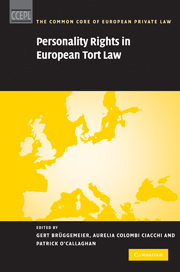Book contents
- Frontmatter
- Contents
- List of contributors
- National reporters
- General editors' preface
- Preface
- Editorial note
- List of abbreviations
- Part I Mapping the legal landscape
- Part II Case studies
- 4 Case 1: The corrupt politician
- 5 Case 2: Convicted law professor
- 6 Case 3: The paedophile case
- 7 Case 4: An invented life story?
- 8 Case 5: A former statesman's family life
- 9 Case 6: A satirical magazine
- 10 Case 7: A snapshot of a person
- 11 Case 8: A paparazzo's telephoto lens
- 12 Case 9: Naked.Little.Girl.Com
- 13 Case 10: The late famous tennis player
- 14 Case 11: The popular TV presenter
- 15 Case 12: Copied emails
- 16 Case 13: Brigitte's diaries
- 17 Case 14: Tape recordings of a committee meeting
- 18 Case 15: ‘Light cigarettes reduce the risk of cancer’
- 19 Case 16: Doctor's non-disclosure of a foetal disease
- 20 Case 17: WAF – A gang of incompetents?
- Part III A common core of personality protection
- Index
6 - Case 3: The paedophile case
from Part II - Case studies
Published online by Cambridge University Press: 06 July 2010
- Frontmatter
- Contents
- List of contributors
- National reporters
- General editors' preface
- Preface
- Editorial note
- List of abbreviations
- Part I Mapping the legal landscape
- Part II Case studies
- 4 Case 1: The corrupt politician
- 5 Case 2: Convicted law professor
- 6 Case 3: The paedophile case
- 7 Case 4: An invented life story?
- 8 Case 5: A former statesman's family life
- 9 Case 6: A satirical magazine
- 10 Case 7: A snapshot of a person
- 11 Case 8: A paparazzo's telephoto lens
- 12 Case 9: Naked.Little.Girl.Com
- 13 Case 10: The late famous tennis player
- 14 Case 11: The popular TV presenter
- 15 Case 12: Copied emails
- 16 Case 13: Brigitte's diaries
- 17 Case 14: Tape recordings of a committee meeting
- 18 Case 15: ‘Light cigarettes reduce the risk of cancer’
- 19 Case 16: Doctor's non-disclosure of a foetal disease
- 20 Case 17: WAF – A gang of incompetents?
- Part III A common core of personality protection
- Index
Summary
Case
A detailed report containing the names and photographs of several paedophiles convicted by criminal courts is published in a high-circulation magazine. One of the paedophiles, Larry, was convicted three years ago. He was released from prison a week after the publication of the list.
Can Larry sue for damages?
Discussions
Austria
Operative rules
Larry's claim for damages will probably fail under Austrian Law.
Descriptive formants
If a general right to remain anonymous under § 7a MedienG (see Case 1) were acknowledged, this would conflict with the media's duty of ‘warning and protecting’ as a particular element of the ‘watchdog’ function of media, as is emphasised by some scholars and courts in Austria.
This is particularly true in cases of sexual offences involving children. Here, the interests of not only the parents but also of the public in protecting children against the long-lasting and severe consequences of sexual abuse clearly prevail over the interest of the convicted criminal to be reincorporated into society.
The Higher Regional Court of Graz, for example, held that a paedophile who was sentenced to 15 months in jail had no right to remain anonymous when released from prison. The public interest in warning and protecting potential future victims must be considered higher than the interests of the paedophile.
Applying these rules to our case, there is no chance either for Larry's claim for an injunction (§ 381 EO) or for a claim in damages pursuant to § 7a MedienG.
- Type
- Chapter
- Information
- Personality Rights in European Tort Law , pp. 178 - 205Publisher: Cambridge University PressPrint publication year: 2010



